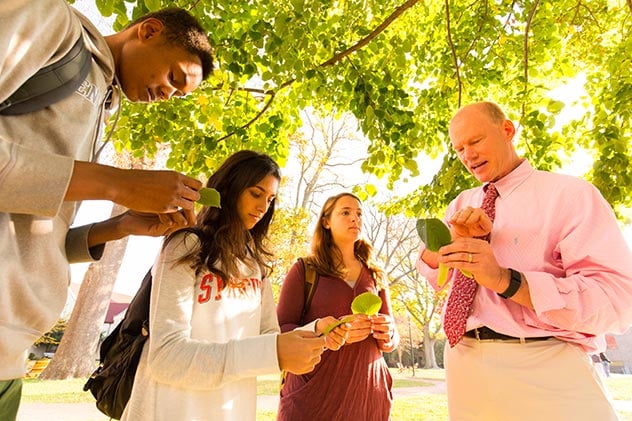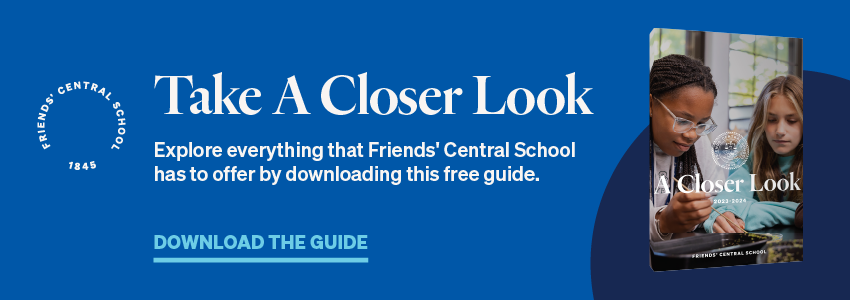
If you are in the process of selecting a school for your child to attend, then you are undoubtedly asking a lot of questions—of both yourself and the schools that you are considering. These might include things like:
- What are the pros and cons of sending my child to an independent school?
- Is an independent school a better fit for my child than a public school?
- How can I compare the independent schools that we are considering?
Though the questions may differ, they are all trying to get at the answer to one specific question: Will my child thrive in an independent school setting? And, specifically, will they thrive at this independent school?
To help make your decision a little easier, we wanted to provide some questions that you should ask of any school that you are considering for your child. We believe that the answers to these questions will help you more than anything else in knowing whether or not a school is a good fit for your family, and whether or not your child will truly thrive in that particular educational setting. Use them to frame your thinking as you narrow down your options and select the school that your child will finally attend.
Here are four questions you should ask when choosing an independent school for your child:
1. What will my child’s experience be like when they first join a new school community?
Transitioning is hard for everyone, and for children especially. Joining a new school community brings with it excitement—for new friends, new classes, new curriculum, new opportunities, and new experiences—but also means leaving certain things behind, like old friends and familiar hallways and classrooms.
Ready to take the next step? Come visit Friends' Central to see what we're all about!
As a parent, you want to ease the transition for your child as much as possible. The best way for you to do this is to know what your child’s experience will be like when they first join their new school community—especially during the first few weeks. What kinds of activities are available to facilitate new friendships? What kind of support is available for children who are struggling with the transition? Are the teachers and faculty trained to identify students who are struggling?
Finding the answers to these questions before enrolling your child will help you make sure that the school offers a support system that will help your child thrive and become resilient, especially during their first few critical weeks of classes.
2. How will the teachers interact with my child?
Understanding how the teachers will interact with you and your child at their new school is critical. In addition to ensuring a smooth transition between schools, teachers, and staff will play a major role in educating your child!
In this regard, there are certain things that you should know before ultimately making your school choice. Your goal in answering these questions is to make sure that the school you are considering meshes well with the educational goals you have for your child.
- What is the teaching style of the educators at this school? Many schools follow the educational trope of teacher-as-lecturer, which is a dated model and less effective with younger children, though, because of the way children learn. Other schools follow a more collaborative approach, where children are taught to think independently, engage in their own education, and discuss their lessons, which has been shown to increase critical thinking ability and create more well-rounded pupils. Make sure that the educational style of the teachers at the school match your own goals for your child.
- Will teachers challenge and support my child? Will teachers meet with children outside of class time to offer extra challenge, if they need help with an assignment, or for one-on-one instruction? Are the teachers trained to spot social and emotional issues, such as depression and anxiety? Do the teachers truly care about my child’s development and well-being? Do teachers want my child to achieve their own best academic performance?
- How will the teachers interact with me? You undoubtedly want to, and should, continue to play a powerful role in your child’s education. For that reason, it is important to know how your child’s teachers will foster their relationship with you. How will they communicate your child’s progress and setbacks? How will they foster a partnership between school and home?
3. How will the curriculum foster creativity and excellence in my child?
When it comes to selecting a school, special attention and importance should be placed on evaluating the curriculum that your child will experience. After all, that curriculum is going to play a huge part in shaping your child into an intelligent, well-informed adult capable of critical thinking and will be decisive in preparing your child for college and a life of work.
To that end, it is important that you understand the kinds of coursework that your child will engage in. What is the typical study tract that students experience? Are there opportunities outside of the classroom—in the form of clubs, the arts, sports, etc.—that will reinforce and complement what my child is learning in school and at home?
4. How will the school shape leadership in my child and nurture their unique strengths?
Obviously, one of the primary objectives in choosing a school for your child is ensuring that they are going to get a quality education that will lay the groundwork for college and a future career. But just as important as intellectual development is personal development. As such, it is important that the school you are considering for your child offers opportunities for the development of leadership skills and other strengths latent in your child.
Do the faculty and curriculum foster personal exploration and growth through electives and extracurriculars? What opportunities are there for my child to exercise and develop leadership skills, which will be important in work and life beyond school? Will my child be able to leverage their unique strengths and abilities in their studies?
Testing Compatibility
Every student’s needs are different, and every parent’s goals for their children will not be the same. For parents who are considering independent schools for their child, it is important to properly evaluate your options before making a final decision on the school your child will attend. By asking the questions above of each school you are considering, you can ensure that the school you ultimately choose for your child is compatible with the educational goals and priorities that you’ve set for your child.



